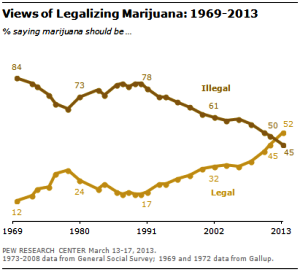A slew of celebrities, including some not-so-usual suspects (the Kardashians!?), as well as faith, academic, and media figures, have signed on to a letter to President Obama urging him to press forward on drug and sentencing reform.
Meet Stingray, law enforcement's newest high-tech weapon in its fight against crime. Civil libertarians and privacy advocates have some concerns, and they're starting to make their way into the federal courts.
StoptheDrugWar.org needs your support to continue our work during the most important time in drug reform we've ever seen. We have gifts to send you too, with donations of $15 or more.
For the first time in 40 years, the Pew poll finds majority support for marijuana legalization. That's in line with other recent polls showing support for marijuana legalization at the tipping point.
Rhode Island is set to see its first dispensary open next, Mendocino County faces down the feds, and more news from around the country.
The White House released the FY 2014 drug budget Wednesday. Its "21st Century drug policy" still has some 20th Century priorities.
The International Drug Policy Reform Conference is a biennial event that brings together people from around the world who believe that the war on drugs is doing more harm than good.
Medical marijuana legislation has cleared the Maryland legislature, and the governor has said he will sign it, but it's unclear just when and where patients will be able to obtain their medicine.
Marijuana legalization bills have been introduced in eight states this year. One is actually moving in Oregon.
First marijuana legalization and now decriminalization. Marijuana law reform (except for medical marijuana) is dead this year in Hawaii, and probably next year, too.
With Alabama and Pennsylvania officially coming on board, there are now eight states that have seen marijuana legalization bills introduced this year.
A young Texas woman with drug warrants is dead after fleeing a traffic stop. Did she hit a cop before he shot her or vice versa?
Some Utah narcs are having a spotlight shone on them, an NYPD cop goes down for robbing drug dealers, and a Florida deputy gets caught buying pain pills and stealing them from his aunt.
A coalition of more than 175 artists, actors, athletes, elected officials, and civil rights and civil liberties advocates Tuesday sent an open letter to President Obama urging him to redouble his efforts to shift from a punitive, repressive federal criminal justice policy to one emphasizing prevention and rehabilitation.

Russell Simmons, 2012 Tribeca Film Festival (courtesy David Shankbone via Wikimedia)
The US is the world's leading incarcerator, with more than 2.3 million people behind bars. The US leads the world both in absolute numbers of prisoners and in prisoners per capita, with 715 per capita,
comfortably leading the nearest per capita contenders, Russia (584) and Belarus (554).
Of those 2.3 million people behind bars, more than 500,000 are charged with drug offenses. While the number of prisoners being held by the states and the number of drug offenders held by the states have begun to decline slightly in recent years as state-level policy makers grapple with economic problems, the federal prison population continues to grow, driven in part by drug offenders. According to the Bureau of Justice Statistics, there were some 95,000 federal drug war prisoners at the end of 2011, nearly half the federal prison population. That's up from only 70,000 a decade ago.
"It is critical that we change both the way we think about drug laws in this country and how we generate positive solutions that leave a lasting impact on rebuilding our communities," said hip-hop mogul Russell Simmons, who helped organize the star-studded effort. "We need to break the school to prison pipeline, support and educate our younger generations and provide them with a path that doesn’t leave them disenfranchised with limited options."
In the letter, the coalition praised Obama for criminal justice reforms he had undertaken, such as the Fair Sentencing Act, which reduced (but did not eliminate) the crack-powder cocaine sentencing disparity, but urged him to do more. "Mr. President, it is evident that you have demonstrated a commitment to pursue alternatives to the enforcement-only "War on Drugs" approach and address the increased incarceration rates for non-violent crimes," the letter said. "We believe the time is right to further the work you have done around revising our national policies on the criminal justice system and continue moving from a suppression-based model to one that focuses on intervention and rehabilitation."
The coalition called for specific reforms.
"Some of the initial policies we recommend is, under the Fair Sentencing Act, extend to all inmates who were subject to 100-to-1 crack-to-powder disparity a chance to have their sentences reduced to those that are more consistent with the magnitude of the offense," the letter said. "We ask your support for the principles of the Justice Safety Valve Act of 2013 (Senate Bill 619), which allows judges to set aside mandatory minimum sentences when they deem appropriate."
The letter also implicitly chided the Obama administration for its failure to make much use of his power to pardon and commute sentences. In fact, Obama has pardoned prisoners or commuted sentences at a much lower rate than any of his recent predecessors. He has granted only 39 pardons and one commutation (of a terminally ill cancer patient) in five years in office, while failing to act on such deserving and well-publicized cases as that of Clarence Aaron, who is now 20 years into a triple life sentence for a cocaine deal in which he was neither the buyer, seller, or supplier of the drugs.
"We ask that you form a panel to review requests for clemency that come to the Office of the Pardon Attorney," the letter said. "Well-publicized errors and omissions by this office have caused untold misery to thousands of people."
The letter also applauded Obama's "staunch commitment" to reentry programs for prisoners who have finished their sentences and urged him to expand those transition programs, and it urged him to support the Youth Prison Reduction through Opportunities, Mentoring, Intervention, Support, and Education (Youth PROMISE) Act (House Bill 1318), "a bill that brings much needed focus on violence and gang intervention and prevention work."
The coalition also asked for a meeting with the president.
"We request the opportunity to meet with you to discuss these ideas further and empower our coalition to help you achieve your goals of reducing crime, lowering drug use, preventing juvenile incarceration and lowering recidivism rates," the letter said.
From the Hollywood community, signatories to the letter included: Roseanne Barr, Russell Brand, Jim Carrey, Cedric The Entertainer, Margaret Cho, Cameron Diaz, Mike Epps, Jamie Foxx, Jon Hamm, Woody Harrelson, Ron Howard, Eugene Jarecki, Scarlett Johannson, the Kardashians, LL Cool J, Eva Longoria, Demi Moore, Michael Moore, Tim Robbins, Chris Rock, Susan Sarandon, Sarah Silverman, Jada Pinkett Smith, Will Smith, and Mark Wahlberg.
From the music community, signatories included: Big Boi of Outkast, Sean "Diddy" Combs, Chuck D, DJ Envy, DJ Pauly D, Ani Difranco, Missy Elliot, Ghostface Killah, Ginuwine, Jennifer Hudson, Ice-T, Talib Kweli, John Legend, Ludacris, Lil Wayne, Natalie Maines, Nicky Minaj, Busta Rhymes, Rick Ross, RZA, and Angela Yee.
From the civil rights and civil liberties community, signatories included: Harry Belafonte, Julian Bond, Dr. Benjamin Chavis, Law Enforcement Against Prohibition leader Neill Franklin, Rev. Jesse Jackson, NAACP head Benjamin Todd Jealous, National Urban League leader Marc Morial, Drug Policy Alliance head Ethan Nadelmann, Rev. Al Sharpton, ACLU head Anthony Romero, Families Against Mandatory Minimums head Julie Stewart, and Dr. Boyce Watkins.
From the faith community, signatories included: Bishop James Clark, Bishop Noel Jones, Bishop Clarence Laney, Bishop Edgar Vann, Dr. Iva Carruthers, Deepak Chopra, Father Michael Pfleger, Rabbi Robyn Fryer Bodzin, Rabbi Menachem Creditor, Rabbi Nina Mandel, Rev. Jamal Bryant, Rev. Delman Coates, Rev. Leah D. Daughtry, Rev. Dr. Fredrick Haynes, Rev. Michael McBride, Rev. Dr. W Franklyn Richardson, and Rev. Barbara Skinner Williams.
Media and academic figures who signed on include: CNN's TJ Holmes, Radio One's Cathy Hughes and Alfred Liggins, former MSNBC host (and now hydroponic farmer!) Dylan Ratigan, "The New Jim Crow" author Michelle Alexander, Michael Eric Dyson, Naomi Klein, Julianne Malveaux, and Spelman College's Dr. Beverly Daniel Tatum.
Also signing were businessmen Virgin Airlines magnate Sir Richard Branson, US Black Chamber of Commerce head Ron Busby, and St. Louis Rams owner Chip Rosenbloom, elected officials Congressman Tony Cardenas (D-CA), Congressman Keith Ellison (D-MN), Congresswoman Marcia Fudge (D-OH), Congresswoman Barbara Lee (D-CA), Congressman Bobby Rush (D-IL), and Congressman Bobby Scott (D-VA), and professional athletes Brendon Ayanbadejo, Lamar Odom, Isaiah Thomas, and MikeTyson, among others.
"The letter is intended to be a respectful appeal to the Obama administration asking that we develop productive pathways to supporting families that have been harmed by the War on Drugs," said Dr. Boyce Watkins, author, entrepreneur, and current scholar in residence in entrepreneurship and innovation at Syracuse University. "Countless numbers of children have been waiting decades for their parents to come home, and America is made safer if we break the cycle of mass incarceration. Time is of the essence, for with each passing year that we allow injustice to prevail, our nation loses another piece of its soul. We must carefully examine the impact of the War on Drugs and the millions of living, breathing Americans who've been affected. It is, quite simply, the right thing to do."
"So called 'tough on crime' policies have failed our nation and its families, while 'smart on crime' policies work," said NAACP head Benjamin Todd Jealous. "When we know that drug treatment is seven times more effective than incarceration for drug addicts, basic human decency demands our nation makes the switch. The fate of hundreds of people and the children who need them home and sober hang in the balance. Great progress is being made in states from New York to Georgia with strong bipartisan support. The time has come for all of us to do all that we can. The future of our families, states, and nation demand it."
Will President Obama respond to this clarion call for action? Stay tuned.
back to top
special to Drug War Chronicle by independent investigative journalist Clarence Walker, [email protected]
Blocked by a Supreme Court decision from using GPS tracking devices without a warrant, federal investigators and other law enforcement agencies are turning to a new, more powerful and more threatening technology in their bid to spy more freely on those they suspect of drug crimes. That's leading civil libertarians, electronic privacy advocates, and even some federal judges to raise the alarm about a new surveillance technology whose use has yet to be taken up definitively by the federal courts.

StingRay cell phone spying device (US Patent photo)
When a suspect makes a phone call, the StingRay tricks the cell into sending its signal back to the police, thus preventing the signal from traveling back to the suspect's wireless carrier. But not only does StingRay track the targeted cell phone, it also extracts data off potentially thousands of other cell phone users in the area.
Although manufactured by a Germany and Britain-based firm, the StingRay devices are sold in the US by the Harris Corporation, an international telecommunications equipment company. It gets between $60,000 and $175,000 for each Stingray it sells to US law enforcement agencies.
[While the US courts are only beginning to grapple with StingRay, the high tech cat-and-mouse game between cops and criminals continues afoot. Foreign hackers reportedly sell an underground IMSI tracker to counter the Stingray to anyone who asks for $1000. And in December 2011, noted German security expert Karsten Nohl released "Catcher Catcher," powerful software that monitors a network's traffic to seek out the StingRay in use.]
Originally intended for terrorism investigations, the feds and local law enforcement agencies are now using the James Bond-type surveillance to track cell phones in drug war cases across the nation without a warrant. Federal officials say that is fine -- responding to a Freedom of Information Act (FOIA) request filed by the Electronic Freedom Foundation (EFF) and the First Amendment Coalition, the Justice Department argued that no warrant was needed to use StingRay technology.
"If a device is not capturing the contents of a particular dialogue call, the device does not require a warrant, but only a court order under the Pen Register Statute showing the material obtained is relevant to an ongoing investigation," the department wrote.
The FBI claims that it is adhering to lawful standards in using StingRay. "The bureau advises field officers to work closely with the US Attorney's Office in their districts to comply with legal requirements," FBI spokesman Chris Allen told the Washington Post last week, but the agency has refused to fully disclose whether or not its agents obtain probable cause warrants to track phones using the controversial device.
And the federal government's response to the EFF's FOIA about Stingray wasn't exactly responsive. While the FOIA request generated over 20,000 records related to StingRay, the Justice Department released only a pair of court orders and a handful of heavily redacted documents that didn't explain when and how the technology was used.
The LA Weekly reported in January that the StingRay "intended to fight terrorism was used in far more routine Los Angeles Police criminal investigations," apparently without the courts' knowledge that it probes the lives of non-suspects living in the same neighborhood with a suspect.
Critics say the technology wrongfully invades technology and that its uncontrolled use by law enforcement raised constitutional questions. "It is the biggest threat to cell phone privacy you don't know about," EFF said in a statement.
ACLU privacy researcher Christopher Soghoian told a Yale Law School Location Tracking and Biometrics Conference panel last month that "the government uses the device either when a target is routinely and quickly changing phones to thwart a wiretap or when police don't have sufficient cause for a warrant."
"The government is hiding information about new surveillance technology not only from the public, but even from the courts," ACLU staff attorney Linda Lye wrote in a legal brief in the first pending federal StingRay case (see below). "By keeping courts in the dark about new technologies, the government is essentially seeking to write its own search warrants, and that's not how the Constitution works."
Lye further expressed concern over the StingRay's ability to interfere with cell phone signals in violation of Federal Communication Act. "We haven't seen documents suggesting the LAPD or any other agency have sought or obtained FCC authorization," she wrote.

StingRay pricing chart (publicintelligence.net)
Advocates also raised alarms over another troubling issue: Using the StingRay allows investigators to bypass the routine process of obtaining fee-based location data from cell service providers like Sprint, AT&T, Verizon, T-Mobile and Comcast. Unlike buying location data fro service providers, using StingRay leaves no paper trail for defense attorneys.
Crack defense attorney Stephen Leckar who scored a victory in a landmark Supreme Court decision over the feds' warrantless use of a GPS tracker in US v. Jones, a cocaine trafficking case where the government tracked Jones' vehicle for weeks without a warrant, also has concerns.
"Anytime the government refuses to disclose the ambit of its investigatory device, one has to wonder, what's really happening," he told the Chronicle. "If without a warrant the feds use this sophisticated device for entry into people's homes, accessing private information, they may run afoul of a concurring opinion by Justice Alito, who ruled in US v Jones whether people would view unwarranted monitoring of their home or property as Constitutionally repugnant."
Leckar cited Supreme Court precedent in Katz v. US (privacy) and US v. Kyllo (thermal imaging), where the Supreme Court prohibited searches conducted by police from outside the home to obtain information behind closed doors. Similar legal thinking marked February's Supreme Court decision in a case where it prohibited the warrantless use of drug dogs to sniff a residence, Florida v. Jardines.
The EFF FOIA lawsuit shed light on how the US government sold StingRay devices to state and local law enforcement agencies for use specifically in drug cases. The Los Angeles and Fort Worth police departments have publicly acknowledged buying the devices, and records show that they are using them for drug investigations.
"Out of 155 cell phone investigations conducted by LAPD between June and September 2012, none of these cases involved terrorism, but primarily involved drugs and other felonies," said Peter Scheer, director of the First Amendment Center.
The StingRay technology is so new and so powerful that it not only raises Fourth Amendment concerns, it also raises questions about whether police and federal agents are withholding information about it from judges to win approval to monitor suspects without meeting the probable cause standard required by the Fourth. At least one federal judge thinks they are. Magistrate Judge Brian Owsley of the Southern District of Texas in Corpus Christi told the Yale conference federal prosecutors are using clever techniques to fool judges into allowing use of StingRay. They will draft surveillance requests to appear as Pen Register applications, which don't need to meet the probable cause standards.
"After receiving a second StingRay request," Owsley told the panel, "I emailed every magistrate judge in the country telling them about the device. And hardly anyone understood them."
In a earlier decision related to a Cell-site Simulator, Judge Owsley denied a DEA request to obtain data information to identify where the cell phone belonging to a drug trafficker was located. DEA wanted to use the suspect's E911 emergency tracking system that is operated by the wireless carrier. E911 trackers reads signals sent to satellites from a cell phone's GPS chip or by triangulation of radio transmitted signal. Owsley told the panel that federal agents and US attorneys often apply for a court order to show that any information obtained with a StingRay falls under the Stored Communication Act and the Pen Register statute.
DEA later petitioned Judge Owsley to issue an order allowing the agent to track a known drug dealer with the StingRay. DEA emphasized to Owsley how urgently they needed approval because the dealer had repeatedly changed cell phones while they spied on him. Owsley flatly denied the request, indicating the StingRay was not covered under federal statute and that DEA and prosecutors had failed to disclose what they expected to obtain through the use of the stored data inside the drug dealer's phone, protected by the Fourth Amendment.
"There was no affidavit attached to demonstrate probable cause as required by law under rule 41 of federal criminal procedures," Owsley pointed out. The swiping of data off wireless phones is "cell tower dumps on steroids," Owsley concluded.
But judges in other districts have ruled favorably for the government. A federal magistrate judge in Houston approved DEA request for cell tower data without probable cause. More recently, New York Southern District Federal Magistrate Judge Gabriel Gorenstein approved warrantless cell-site data.
"The government did not install the tracking device -- and the cell user chose to carry the phone that permitted transmission of its information to a carrier," Gorenstein held in that opinion. "Therefore no warrant is needed."
In a related case, US District Court Judge Liam O'Grady of the Northern District of Virginia ruled that the government could obtain data from Twitter accounts of three Wikileakers without a warrant. Because they had turned over their IP addresses when they opened their Twitter accounts, they had no expectation of privacy, he ruled.
"Petitioners knew or should have known that their IP information was subject to examination by Twitter, so they had a lessened expectation of privacy in that information, particularly in light of their apparent consent to the Twitter terms of service and privacy policy," Judge O'Grady wrote.
A federal judge in Arizona is now set to render a decision in the nation's first StingRay case. After a hearing last week, the court in US v. Rigmaiden is expected to issue a ruling that could set privacy limits on how law enforcement uses the new technology. Just as the issue of GPS tracking technology eventually ended up before the Supreme Court, this latest iteration of the ongoing balancing act between enabling law enforcement to do its job and protecting the privacy and Fourth Amendment rights of citizens could well be headed there, too.
back to top
Dear friend,
StoptheDrugWar.org needs your help to continue our programs -- like this newsletter,
Drug War Chronicle -- during this most important time in the cause there has ever been.
Click here for some examples of how activists around the world rely on
Drug War Chronicle in their work.
As our thanks for your support, we continue our full set of membership offers, some of them available with donations of $15 or greater to our organization. We also continue to offer, with donations of $35 or more, "
Marijuana Legalization: What Everyone Needs to Know," authors of which were
recently hired to consult with the state of Washington on implementing legalization there.
The newest item is a pair of reports that highlight the US and international legal landscapes as legalization becomes a mainstream issue. (We'll send you both for the $15.) Though the text of each report can be found online, for $15 or more you can hold the nice printed copies -- the history in the making -- in your hands. They are:
- "On the Limits of Federal Supremacy: When States Relax (or Abandon) Marijuana Bans," a Cato Institute Policy Analysis by Vanderbilt law professor Robert Mikos, explores the limits in federal law and resources for enforcing marijuana prohibition in states that have legalized.
- "Governing the Global Drug Wars," a special report by London School of Economics IDEAS, details the history of the global prohibition regime; the obstacles it poses to nations seeking to explore legalization and other reforms, and efforts by nations and agencies to transform the system into one respecting public health and human rights.
We are also pleased to continue offering the following items (while supplies last), now also with donations of $15 or more:
- Emperor of Hemp DVD, about the life and work of Jack Herer (memorial tribute edition)
- StoptheDrugWar.org strobe light
- StoptheDrugWar.org stamp and ink pad
- StoptheDrugWar.org mouse pad
Though we offer many items for $15, I hope you will consider making a larger donation if you are able, or supplementing your initial gift with a monthly one. If the gifts are not important to you, I hope you'll consider sending a donation that's just for our work.
Donations can be tax-deductible, supporting our educational work, or non-deductible, supporting our lobbying work. (Note that selecting any gift items reduces the amount of your donation that is deductible -- which with a smaller gift amount can be most of it.) They can be made online on our web site by credit card or PayPal, or sent by mail to P.O. Box 18402, Washington, DC 20036. If you are donating by check, please make it payable to DRCNet Foundation (if tax-deductible) or Drug Reform Coordination Network (if not deductible).
If you wish to donate stock, the information to give your brokerage is Ameritrade, (800) 669-3900), DTC #0188, and account number 781926492 for tax-deductible gifts or 864663500 for non-deductible gifts -- please make sure to contact us if donating in this way.
Thank you for standing with us to stop the drug war's cruelties and meet the opportunity this time offers to make a brighter future. As recent events show: Time, and the truth, are on our side!
Sincerely,

David Borden, Executive Director
StoptheDrugWar.org
Washington, DC
http://stopthedrugwar.org
back to top
For the first time since the Pew Research Center started polling on the question 40 years ago, it has found that a majority of Americans favor legalizing marijuana. In a Pew poll released Thursday, 52% supported legalization, with only 45% opposed.
The Pew results are in line with
other recent polls on the topic. Five polls released in December showed marijuana legalization hovering on the cusp of majority support. Those polls had support at 47%, 48%, 50%, 54%, and 57%, respectively.
The Pew poll found majority support for marijuana legalization among Democrats, independents, and liberal and moderate Republicans. There was also majority support among all age groups except those before the Baby Boom generation.
The gender gap continues to be evident. Some 57% of men supported legalization, but only 48% of women.
The poll also found considerable skepticism about enforcing the marijuana laws, with 72% agreeing that "government efforts to enforce marijuana laws cost more than they are worth" and 60% saying that the federal government should not try to enforce marijuana laws in states where it is legal.
Drug reformers liked the poll results.
"I've always tended to be cautious in claiming that we've hit the 'tipping point' on marijuana legalization," said Ethan Nadelmann, executive director of the Drug Policy Alliance. "But we're there now. And I'd say we're trailing marriage equality by just a half-step, even if far fewer elected officials are willing to join publicly with us as yet."
The Pew poll has lots and lots of informative detail. It's worth clicking on the link above to check it out.
back to top
Rhode Island is set to see its first dispensary open next, Mendocino County faces down the feds, and more news from around the country. Let's get to it:
CaliforniaOn Tuesday, the city of Concord banned outdoor grows. The "outdoor cultivation of medical marijuana" is banned by ordinance in order to properly "maintain and protect the public health, safety and welfare of the citizens of Concord." The ban came despite appeals from a number of residents to delay or defeat the ordinance. The vote was unanimous.
Also on Tuesday, Mendocino County officials announced they had reached agreement with federal prosecutors on limiting the feds' fishing expedition into the county's legal medical marijuana growers' program. No personal identifying information from the county's program will be released to US Attorney Melinda Haag. In October, Haag had demanded just about anything to do with the program -- names and locations of pot gardeners, county bank records, "any and all" legal correspondence, etc. The county fought back, hiring a San Francisco attorney to fight the federal subpoena. Now, the feds have backed down.
Also on Tuesday, Humboldt County supervisors okayed a Myrtletown dispensary. The Humboldt Collective had operated there, but had its permit revoked after a former director was arrested last year in Pennsylvania on marijuana trafficking charges. The new directors have made minor changes sought by the county, and now they have received permission to remain in business.
Florida
On Wednesday, activists were meeting with a key state senator in a bid to keep a medical marijuana bill alive. Senator Aaron Bean, chair of the Senate Health Policy Committee, has the bill, Senate Bill 1250, locked up in committee. No word yet on whether he has been moved to allow the bill to progress. The bill is also known as the Cathy Jordan Medical Cannabis Act, after a medical marijuana patient who was arrested along with her husband for growing her medicine. Charges against the couple were dropped last week.
Maine
On Friday and Saturday, dispensary workers rallied to protest working conditions. The workers' target was Wellness Connection of Maine, which operates four dispensaries in the state. Workers said it was ignoring their concerns about working conditions and refusing to recognize their union. Demonstrations took place in Hallowell Friday and Portland Saturday. Wellness Connection said it was committed to caring for its workers and doesn't object if they want to join a union.
Massachusetts
On Wednesday, state regulators were debating proposed state medical marijuana rules. One proposed rule would require dispensaries to test their products for contaminants. Americans for Safe Access is calling for state-licensed, independent labs that would not be at risk of federal sanctions because they would not test narcotics and other federally regulated drugs. The proposed rules also include state inspections of dispensaries "at any time without prior notice."
Michigan
Last Wednesday, the state Supreme Court said it would review the legality of a city ban on medical marijuana-related activities. The city of Wyoming had passed a zoning ordinance barring the use, manufacture, or cultivation of medical marijuana, and the court said it wants to review whether the ordinance is superseded by the state's voter-approved medical marijuana law. Significantly, the court also plans to consider if the state law is preempted by a federal law that makes marijuana use illegal.
Montana
Last Friday, a drugged driving bill that could affect patients was signed into law. The bill creates a 5 nanogram per milliliter per se drugged driving level for THC. In addition to the penalties for drugged driving, if convicted under the law, patients would face revocation of their state registry identification card.
New Jersey
On Tuesday, Gov. Chris Christie proposed $1.6 million for the state's medical marijuana program in his state budget. That's more than twice the current spending level. The budget assumes that more dispensaries will open next year. So far, only one out of the six authorized by the state is actually in operation. But patient advocates said a greater budget wouldn't help patients until onerous regulations imposed by the Christie administration are revised.
Oregon
On Tuesday, a bill allowing medical marijuana for PTSD passed the Senate Judiciary Committee. Senate Bill 281 now moves to the Senate floor. Currently, medical marijuana is currently allowed for patients with certain debilitating medical conditions such as cancer, glaucoma, Alzheimer's disease, HIV and AIDS. The bill would add PTSD to the list.
Rhode Island
Last Thursday, what will be the state's first dispensary got its license. The Thomas C. Slater Compassion Center is now set to open April 19.
back to top
The Obama administration released its Fiscal Year 2014 budget proposal Wednesday, including its 2014 federal drug budget. Pundits and politicians on both sides of the aisle quickly pronounced the Obama budget dead on arrival, but it does provide both a window into administration thinking on drug policy and a starting point for negotiations.

Obama's 2014 drug budget came out Wednesday. (whitehouse.gov)
There's not much new. The historic 2:1 ratio between law enforcement and interdiction spending and treatment and prevention spending, representing what critics have long called an over-reliance on enforcement, is slightly attenuated. The Obama 2014 drug budget allocates 58% of spending to enforcement vs. 42% to treatment and prevention. It is a slight improvement over the FY 2013 drug budget, where the figures were 62% and 38% -- starting to climb away from 2:1, if it continues, but not dramatically.
In a post on its web site, the Office of National Drug Control Policy's Rafael Lemaitre writes that treatment and prevention spending now tops domestic law enforcement spending, and "that's what a 21st Century approach to drug policy looks like," but that post does not include interdiction and international drug enforcement spending. When those are included, the Obama drug budget is clearly weighted on the side of law enforcement -- very much what a late 20th Century drug policy looked like.
Still, the budget calls for an 18% increase in treatment funding, and cuts in interdiction and international enforcement funding, as welling as reducing funding for the High Intensity Drug Trafficking Area (HIDTA) program, which generates ever more drug arrests working with state and local drug task forces. But spending for both the DEA and Bureau of Prisons is going up, and that raised the hackles of one drug reform activist.
"The administration deserves some credit for moving this ratio slightly in the right direction over the years, but a drug control budget that increases funding for the DEA and the Bureau of Prisons is simply not the kind of strategy we need in the 21st Century," said Tom Angell, spokesman for the Marijuana Majority. "At a time when a majority of Americans support legalizing marijuana, and states are moving to end prohibition, this president should be spending less of our money paying narcs to send people to prison, not more. If, as administration officials say, 'we can't arrest our way out of the drug problem,' then why are they continuing to devote so many resources to arresting people for drug problems?"
The administration also deserves "some credit" for reducing HIDTA funding, said Angell, but "still $193 million for the program is $193 million more than should be used to arrest people for drugs in the 21st Century."
back to top

vigil outside Albuquerque Convention Center, 2009 drug policy reform conference
is a biennial event that brings together people from around the world who believe that the war on drugs is doing more harm than good. It brings together over 1,000 attendees representing 30 different countries.
StoptheDrugWar.org is a partner in this year's conference, which will take place October 23-26 in Denver, Colorado, as officials craft the state's implementation plan for legal marijuana under Amendment 64. Attendees will have the opportunity to spend three days interacting with people committed to finding alternatives to the war on drugs -- marijuana legalization and many other issues in drug policy -- while participating in sessions given by leading experts from around the world.
Here are what some attendees had to say about the 2011 conference:
- "The International Drug Reform Conference was, by far, one of the most eye opening experiences of my life... It felt as if I were at the epicenter of the most conscious people on the planet."
- "Every workshop that I attended had excellent presenters and panelists. I was extremely pleased to once again attend the 2011 Reform Conference. It was more diverse than ever and very inclusive of issues that I support. See you in Denver!"
- "The Drug Policy Alliance conference is an educational opportunity that every responsible individual should experience -- regardless of your position on the issues."
- "Every two years I look forward to the International Drug Policy Reform Conference, where I know I'll get a chance to hear from, and speak with some of the brightest minds in the drug policy reform movement."
- "If you think the drug war has failed our country and harmed countries like Mexico and you want to do something about it, this is the conference to be at."
Visit http://www.reformconference.org for further information.
back to top
The Maryland Senate Monday passed a bill that would allow seriously ill residents to obtain medical marijuana through state-regulated research programs run by academic medical centers. The House of Delegates approved the bill last month; Gov. Patrick O'Malley is expected to sign it shortly.
The bill,
House Bill 1101, creates a commission that would allow academic medical research centers to apply to operate programs under state regulation that would provide marijuana grown by the federal government or by state-licensed growers. The bill doesn't allow patients to grow their own medicine.
Drug reform advocates had mixed views on what passage of the legislation accomplishes.
"This marks a major step forward for Maryland medical marijuana patients and their families," said Dan Riffle, deputy director of government relations for the Marijuana Policy Project, which helped shepherd the bill through the legislature. "The Assembly's overwhelming support for this important legislation reflects that of the people of Maryland and the nation as a whole. The time has come to allow seriously ill people to obtain and use medical marijuana if their doctors believe it will help them."
But some expressed skepticism about whether the bill will actually result in patients getting access to medical marijuana. The federal government has long refused to provide marijuana, even for Food and Drug Administration-approved studies, and it is unclear just when and where state-licensed growers might appear.
"Maryland has taken a small step in the right direction, but more steps are necessary for patients to actually obtain the medicine they need to alleviate their suffering," said Amanda Reiman of the Drug Policy Alliance. "Maryland has many workable and successful models to draw from: Eighteen states and the District of Columbia have successfully legalized marijuana for medical purposes despite the ongoing federal ban. Medical marijuana is used in those jurisdictions by hundreds of thousands of patients with cancer, HIV/AIDS, multiple sclerosis, Parkinson’s disease and other serious and debilitating illnesses."
Still, it is time for academic medical research centers to step up, said Riffle.
"We hope the state's academic medical centers will take action and apply for the program so they can begin meeting the needs of Maryland residents suffering from debilitating medical conditions," he said. "Individuals suffering from cancer, multiple sclerosis, and other serious illnesses should not be forced to obtain their medicine in the underground market."
back to top
An Oregon bill that would legalize marijuana was approved by the House Judiciary Committee Wednesday on a 6-3 vote after hearing testimony that same day. That marks the first time any Oregon marijuana legalization measure has won a committee vote. The bill now heads to the House Revenue Committee.
The bill, House Bill 3371, would legalize marijuana possession for adults 21 and over, provide for the cultivation of a small number of plants without regulation, and set up a system of taxation and regulation of marijuana commerce. It was sponsored by the Revenue Committee.
"Marijuana legalization is coming to Oregon sooner rather than later," said Anthony Johnson of New Approach Oregon, a group supporting legalization. "It makes sense to regulate marijuana like alcohol and for the legislature to take the lead on the issue and make sure sensible regulations are in place."
The only opposition to the bill at the Wednesday hearing came from the Oregon State Sheriffs' Association, which said it was concerned about drugged driving, underage use, and drug dependency.
"This act will not make the problems of marijuana abuse go away," said Washington County Sheriff Pat Garrett, speaking on behalf of the association.
Oregon became the first state in the nation to decriminalize marijuana in 1973. Last, the Measure 80 marijuana legalization initiative, poorly funded and hobbled by the mixed reputation of its proponent, Paul Stanford, managed to pull in nearly 47% of the popular vote. Activists have been discussing whether to go forward with another initiative in 2014, but if HB 3371 keeps moving, they may not have to wait that long.
back to top
A bill that would have decriminalized the possession of small amounts of marijuana has died in the House. Legislators earlier killed a marijuana legalization bill.
The decriminalization bill,
Senate Bill 472, passed out of the Senate a month ago and saw fervent debate in House committee hearings, but House leaders said there was not enough support for the bill to move forward.
Rep. Karl Rhoads (D-District 29), chairman of the House Judiciary Committee told the Associated Press Wednesday that there weren't enough votes to push the bill through. And although the state's two-year legislative session would allow the bill to be taken up again next year without having to pass the Senate again, Rhoads said he doubted that would happen.
"It was a moderate measure," Rhoads told the AP. "If this couldn't pass, I think it's very unlikely that anything is going to pass next year."
Marijuana reform supporters, including the ACLU of Hawaii and two new coalitions aimed at changing the state's marijuana laws, Fresh Approach Hawaii and the Medical Cannabis Coalition of Hawaii, had been optimistic about the bill's prospects after it passed the Senate, but it ran into stiff opposition from law enforcement and community groups. Police testified that reforming the marijuana laws would make their job more difficult and increase crime.
back to top
And then there were ten. That is, as marijuana legalization bills have been formally introduced this month in Alabama and Pennsylvania, the number of states to see such bills this year is up to ten. The others are Hawaii (already killed), Maine, Maryland (already dead), Massachusetts, Nevada, New Hampshire, Oregon, and Rhode Island.
In Alabama, Rep. Patricia Todd (D-Birmingham) introduced
House Bill 550, the Alabama Cannabis and Hemp Reform Act. It would allow adults 21 and over to possess up to an ounce of marijuana and grow up to 12 plants in a secured space. Adults could share, but not sell, marijuana to other adults.
The bill is headed for the House Public Safety and Homeland Security Committee.
In Pennsylvania, Sen. Daylin Leach (D-17) introduced Senate Bill 528, the Regulate Marijuana Act. It would allow adults 21 and over to grow up to six plants and possess the resulting harvest. It would also allow adults to transfer up to an ounce to other adults. And it would direct the state to come up with a system to regulate and tax marijuana commerce.
The bill has been referred to the Senate Law and Justice Committee.
back to top
A police officer in the suburban Dallas community of Richardson, Texas, shot and killed a woman with outstanding drug arrest warrants as she fled from an attempted traffic stop Monday morning. Emily Krumrei, 32, becomes the 9th person to die in US domestic drug law enforcement operations so far this year.

Emily Josephine Krumrei (Smith County SO)
According to the
Dallas Morning News, citing Richardson police spokesperson
Sgt. Kevin
Perlich, an officer "was attempting to get a violator to pull over in a parking lot" for reasons that are yet unclear, but
Krumrei fled in her Lexus. Shortly thereafter, an officer in a squad car saw her and attempted to stop her, but she refused to pull over.
Krumrei turned onto the southbound frontage road to the North Central Expressway. There, Perlich said, "a third officer near the frontage road was working a traffic accident. He stepped out into the road and tried to get her to stop." But instead, Perlich said, Krumrei accelerated and clipped the officer. "The officer, in fear for his life, fired upon the vehicle," Perlich said.
The Dallas NBC affiliate had a slightly, but significantly, different chronology of the shooting. According to NBC, the officer "fired at least one shot at the woman before being struck by the car."
In either case, the officer was not seriously injured or hospitalized.
Krumrei was taken to a local hospital, where she was pronounced dead. Perlich said an investigation into her death was ongoing, but "it's possible she wasn't stopping because she had several outstanding warrants for her arrests."
The Morning News reported that records show Krumrei had been indicted in Dallas County in April for possessing between one and four grams of cocaine, and that she also had outstanding felony drug warrants from Smith County, a hundred miles to the east.
back to top
Some Utah narcs are having a spotlight shined on them, an NYPD cop goes down for robbing drug dealers, and a Florida deputy gets caught buying pain pills on the street and stealing them from his aunt.Let's get to it:
In Salt Lake City,
federal prosecutors announced Tuesday they were dropping eight cases involving the suburban West Valley City Police Department's narcotics unit, which was disbanded in December. Local prosecutors had already dropped an additional 19 cases last month. All but one of those cases involved drug offenses, and all 19 of the cases dropped by local prosecutors involved West Valley narcotics investigator Shaun Cowley. Last week, the FBI announced it was joining investigations into corruption in the dope squad, as well as whether there has been a cover-up in the
November shooting death Danielle Willard, a suspected heroin user who was gunned down in her car by Cowley and Detective Kevin Salmon. Five months later, West Valley police have yet to make any public pronouncements about results of investigations into her death.
In New York City, an NYPD officer was arrested last Wednesday on charges he was a member of a crew that robbed drug dealers of thousands of dollars in cash and drugs. Officer Jose Tejada, 45, is accused of taking part in three robberies or attempted robberies in 2006 and 2007, while he was assigned to Harlem and in uniform, according to federal prosecutors. He also supplied police uniforms, paraphernalia and police vehicles to crew members. He is charged with conspiracy to commit robbery, conspiracy to facilitate drugs, and unlawful use of a firearm. Tejada is the second NYPD officer charged in more than 100 robberies of drug dealers that began in 2001 and netted more than 250 kilograms of cocaine and a million dollars in cash. Former officer Emmanuel Tavarez was sentenced to 25 years in prison last May for his role in the same crew.
In Key West, Florida, a Monroe County Sheriff's deputy was arrested Saturday on charges he bought drugs from an informant and stole drugs from relatives. Deputy Jaime Miranda went down in a sting, buying fake oxycodone from an informant while on duty, in uniform and in his police cruiser. He was stopped shortly thereafter, and police found nine fake oxycodone tablets (he admitted eating the 10th as soon as he bought it), as well as hydromorphone tablets he admitted stealing from his aunt's house. Miranda is charged with three felonies: conspiracy to purchase narcotics, possession of synthetic narcotics and possession of a controlled substance without a prescription. He made $12,000 bond Saturday night and is suspended without pay pending further investigation.
back to top














